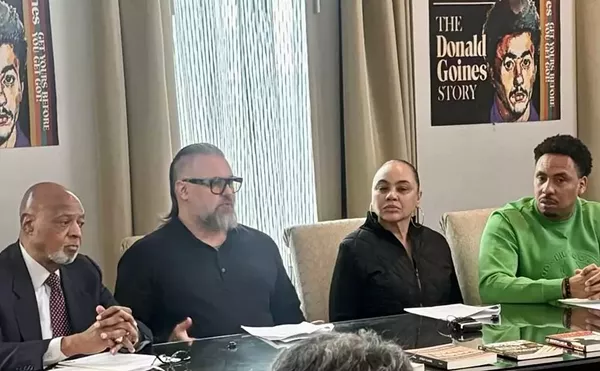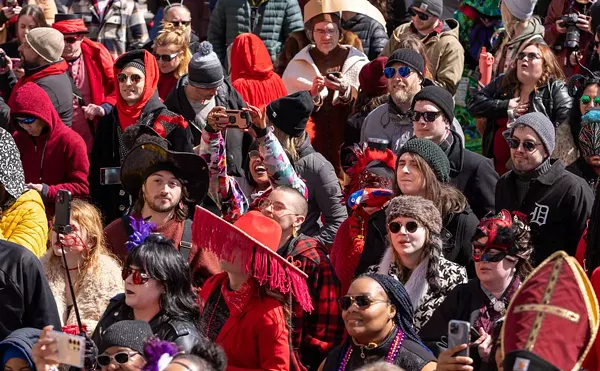If Jerry Lewis based a career on portraying a man in trouble, then Margaret Cho is making hers by means of a woman in great pain. Comedian, self-esteem diva, fag hag, survivor of Hollywood hell, American-Asian laugh emissary, ship-slut with a sailor’s mouth — whatever you want to call her — she’s paved her routine on top of a crass road of truth that might make you cry, but will surely make you laugh, and maybe even teach you a few things about yourself, good or nasty.
Released in 1999, Cho’s one-woman show turned into a concert film (the precursor and live Cliff Notes to the book out this year from Random House), I’m the One That I Want, has been breaking records and winning awards across the country and beyond, but this is by no means an overnight-success story — her concert is a testimony to that.
Born in 1968 to Korean immigrants in the San Francisco Bay Area, Cho wallowed through a miserable childhood littered with ostracism, even inside the Korean community from which she emerged. This sad train of betrayal catapulted her into the world with nothing but her dreams to follow, and Cho went on the road at 16 to perform stand-up.
“Comedy is a rare gift from the gods, an awesome invention. It propels you right into the heart of the universe,” she writes.
But her initial vision dragged on and soured.
“I wanted to be a comedian, not a traveling salesman, but that was essentially what I had become, lunging for the last Eggo waffle at the complimentary continental breakfast at the Comfort Inn in Peoria.”
After years of paying her “road” dues in lonely hotels, playing clubs around the Bay Area, dressing up as Raggedy Ann for FAO Schwarz, doing phone sex and working in her parents’ bookstore, a miracle happened. In 1994, ABC starred Cho in her own sitcom as a rebellious teenager in a conservative Asian-American household. “All American Girl” started out strong, but stifled Cho’s comedic voice and displeased the ethnic communities.
The show was canceled after one season and Cho succumbed to an already established path of addictions. Beginning innocently enough with minty Binaca Blast secretly sprayed in the back of her aunt and uncle’s convenience store, she moved on to more slippery and treacherous habits. She had affairs with pot, Crystal Meth, diet pills, as well as a death wish with alcohol, until one day she decided not to die. Goodbye self-loathing and hello successful off-Broadway show: I’m the One That I Want was filmed at the Warfield in Cho’s hometown of San Francisco.
Since she was practically raised by drag queens, it’s not surprising that the community she’s felt so much warmth and acceptance from has embraced her completely, and that she decided to film her performance in the heart of homosexuality.
“I love the word faggot, because it describes my kind of guy ... I am a fag hag. Fag hags are the backbone of the gay community. Without us, you are nothing.”
Alongside sexually explicit speeches about her promiscuity and animated impersonations of friends and foes, Cho continually pokes and jabs at homosexuals and lesbians. But it’s OK, because she puts herself right inside that fishbowl, insulting, imitating and making fun as a friend. Cho’s book clearly states her acceptance of all genders and sexual preferences, and onstage it permeates her every word and move as a humor born from understanding, like her impersonations of her mother’s phone messages.
Cho takes great care to accurately depict facial gestures and the Korean accent. “Hi, it’s mommy. Don’t marry a white man!”
Cho’s take on her mother may not be flattering on the surface, but it’s saturated with love, and this is what makes her go far beyond regular stand-up shtick.
“People ask me if I ever go too far, if I ever reveal too much of myself and later regret it. I don’t think it is possible to get too personal. We all have pain. We all have doubt and sadness and horrible things that have happened that shouldn’t have, and when we cover them up and try to pretend that everything is OK, then our stories are forgotten, and our truths become lies.”
As with any line of truth, you end up seeing yourself somewhere, and Margaret Cho forces you to have a laugh in an emotionally safe room constructed out of “funny.”
See also "Cho & tell" by Steve Schneider
Anita Schmaltz writes about performance and theater for Metro Times. E-mail her at [email protected]





